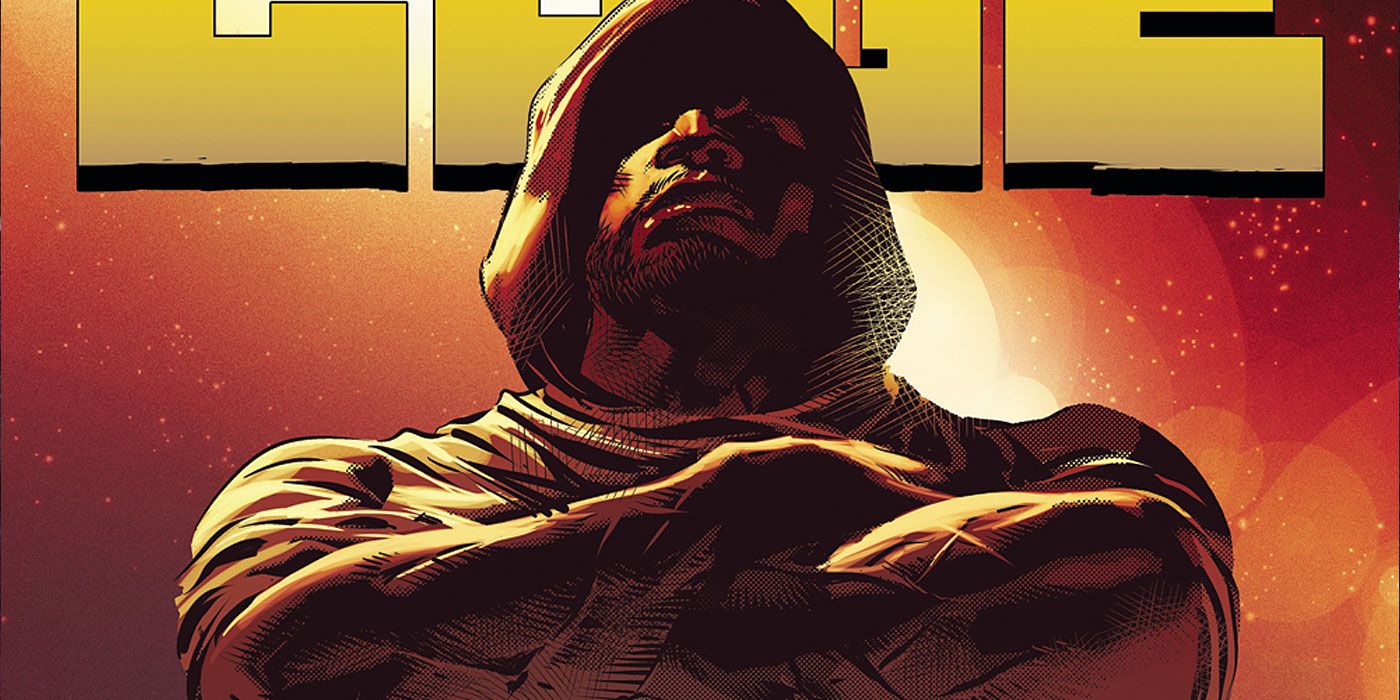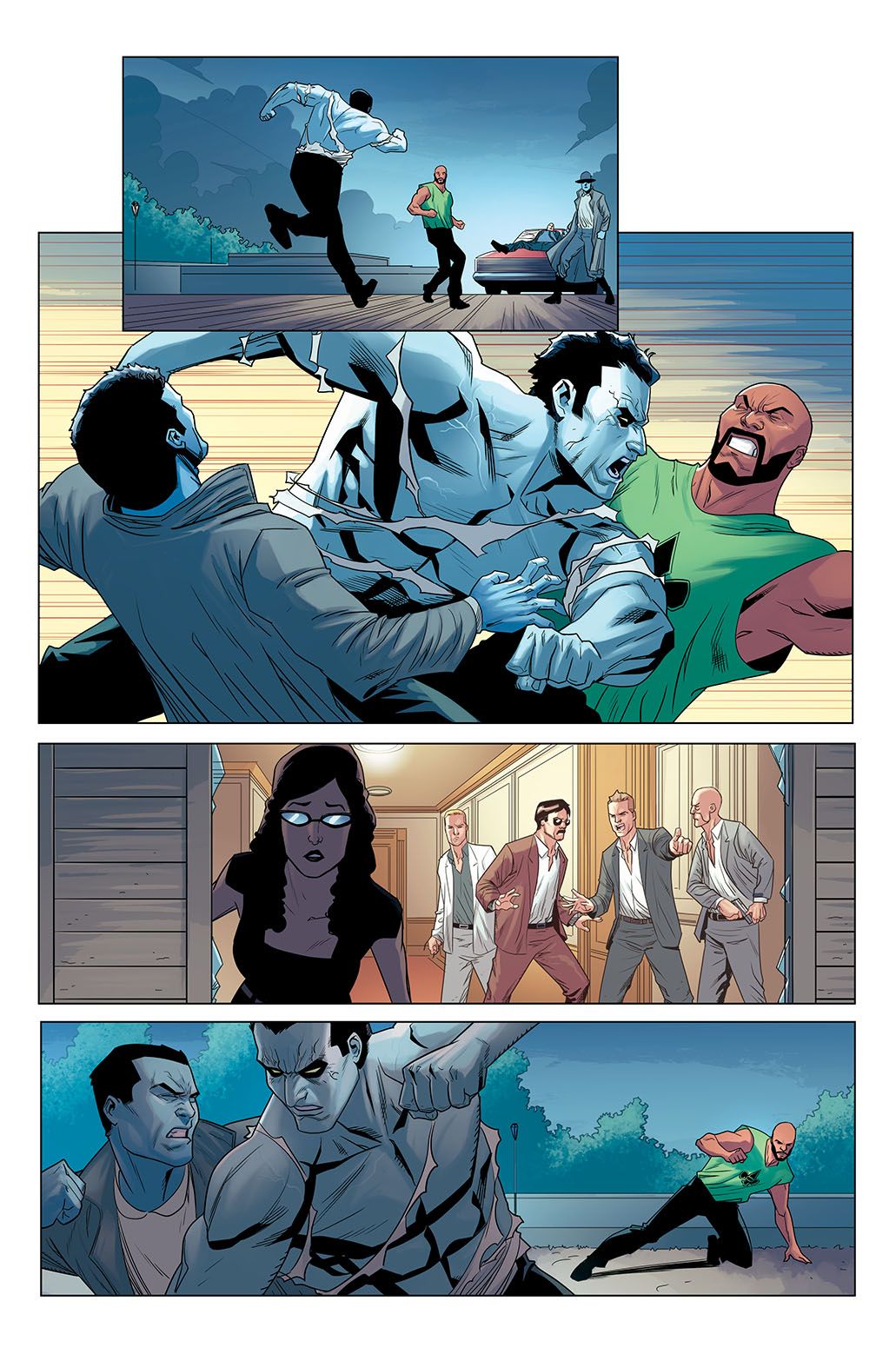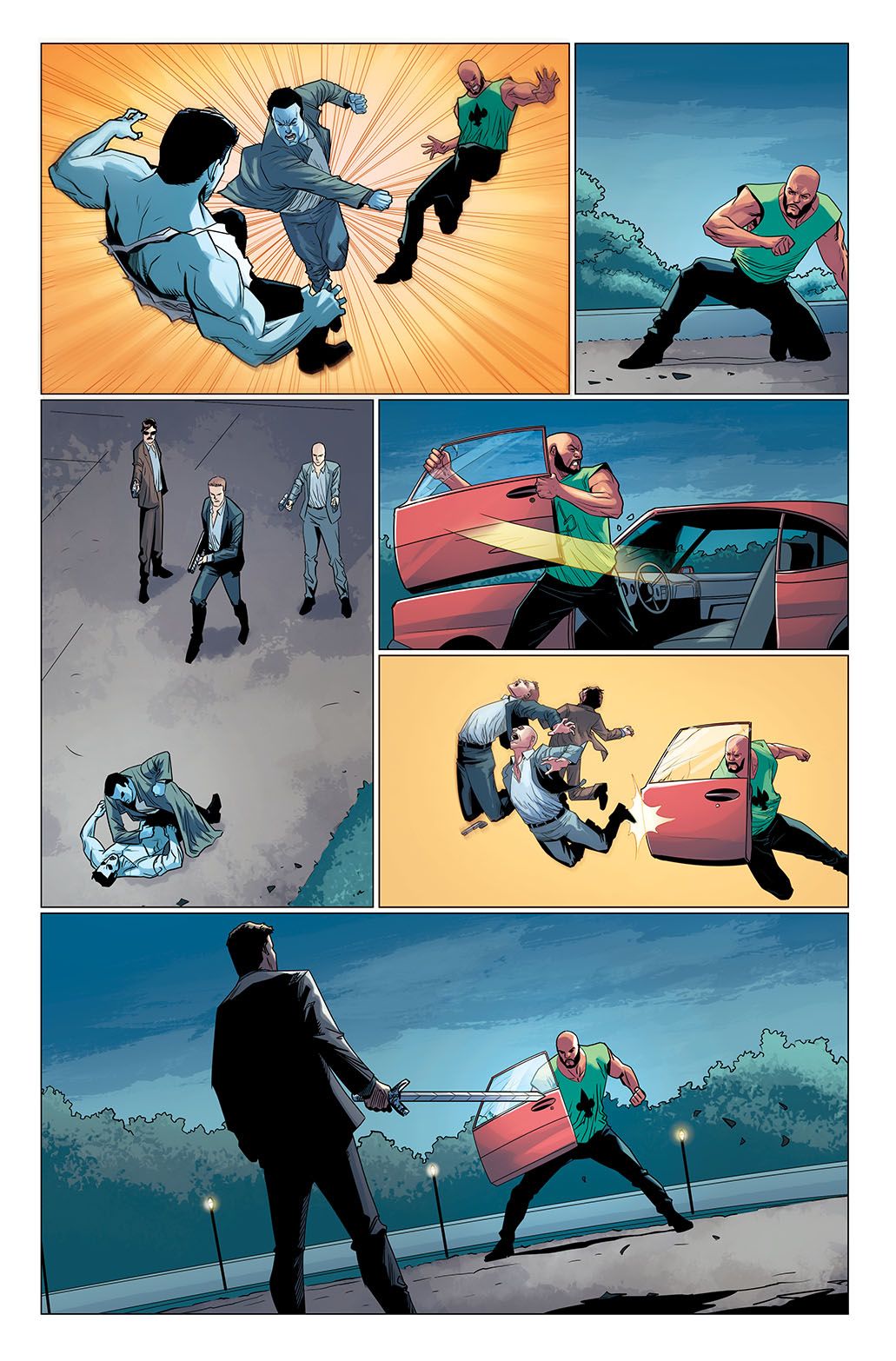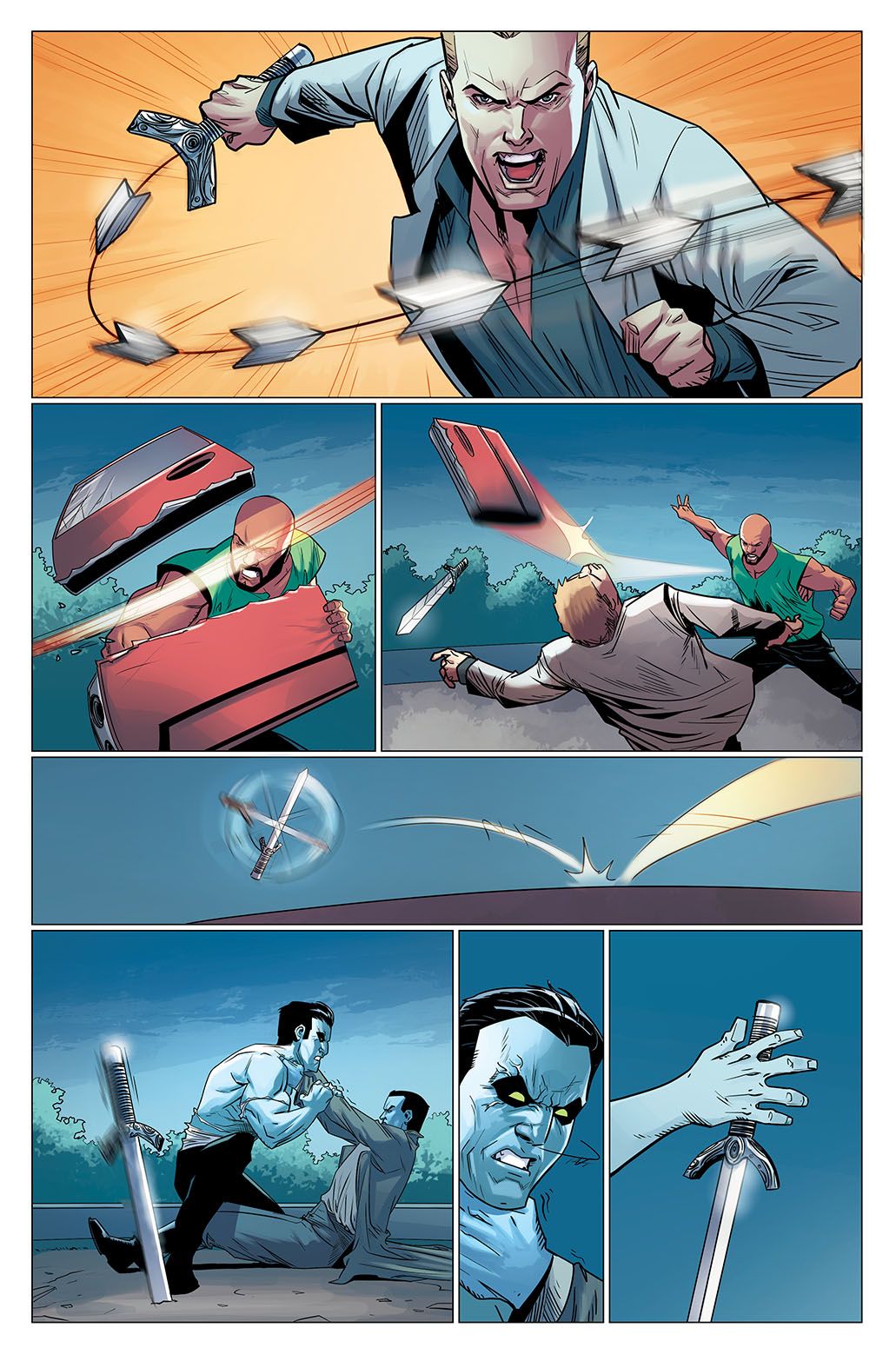When Luke Cage was endowed with his superhuman strength and unbreakable skin he became part of some larger things beyond the Marvel Universe's community of superheroes. The first was that he was one of the sole successful subjects in a science experiment designed to create superhumans; an exclusive fraternity whose membership is pretty much him and Steve Rogers. The second was that Cage became part of the “family” of the man responsible for his superhuman rebirth, Dr. Noah Burstein, a man who often described Cage as being like a son to him and whose scientific curiosity usually lead to disaster and trouble.
RELATED: Defenders Won’t Change Luke Cage: Season 2 Direction
In the first two issues of the new Luke Cageseries writer David Walker and artist Nelson Blake II brought those areas of Luke's life into focus in a big way as their protagonist headed to New Orleans to investigate Burstein's death which has brought him face to face with a number of his surrogate father's failed test subjects including his “brother,” Mitchell Tanner, AKA the super-powered assassin known as Warhawk. CBR spoke with Walker about Luke's new “family,” what Burstein's scientific legacy means to Luke and the larger Marvel Universe, and his plans for the series following the initial arc.
CBR: Luke has a family he chose in his wife Jessica, daughter Danielle, and best friend Danny Rand. It feels like with this arc though you're giving him back something he hasn't had in a while with his brother being dead and his father being so distant; a family he didn't choose. Was that your intention with this first arc?
David Walker: When I was writing Power Man and Iron Fist I went back and read a ton of the old Luke Cage adventures from the '70s from before he teamed up with Iron Fist. Reading that stuff sparked an idea about his relationship with Noah Burstein, and Burstein being a sort of second father to him. That was a reoccurring bit that would pop up in the comics, but it was never really built upon. And the idea of Luke having a father period or any family for that matter wasn't explored until much later in the '90s when they did that series set in Chicago that Marc McLaurin wrote.
Burstein came back in that series, and again there was this idea that Burstein was the father that Luke never really had, but it kind of struck me, that Burstein is one step below a mad scientist. He's Luke's father in the way that Victor Frankenstein was the father of his creation.
So I wanted to play with that and this idea of what makes a family. If I remember correctly there's an issue of Power Man & Iron Fist with Warhawk, Mitchell Tanner, and Burstein says something in that issue like, “Mitchell is kind of like your brother.” Warhawk was a character that was never really developed that well in the Power Man & Iron Fist stuff. He only had like five or six total appearances.
That got me thinking. We have multiple dynamics in our lives that govern how we interact with things like our biological families and the ones we marry into. So I wanted to explore Luke's family dynamic with this guy who claims to be like a father to him and this guy who's kind of his brother, but who would want Warhawk as their brother?
RELATED: Luke Cage: Character Breakdowns Surface For Season 2
That was sort of the beginning of the idea. Then as I was fleshing things out it became clear that to make the story more challenging I needed to remove Luke from the most important thing in his life, his friends and his family. Then we could introduce him to this other family he didn't know he had.
That always comes with inherent challenges because a lot of the time fans want to see the familiar faces. In Luke's case those familiar faces are sort of the foundation on which his whole being is built at this point. It's Jessica, the baby, and Danny Rand. It's all these friends that he's always counted on. So I wanted to take him away from all of that and put him in this other dynamic where he begins to question himself.
It's interesting that you describe Burstein as almost being like a mad scientist because, to me, it feels like the main questions surrounding him are: is he a good guy who take science too far? Or a terrible person who works at places like free clinics because he feels guilty about his mad scientist style proclivities?
[Laughs] Or is it even one step further? Does he turn to clinics, like the ones he's run in the past, because those are the easiest people to work on? There you're dealing with people who are desperate for medical attention.
So it's any one of those three options. I think that character becomes more interesting if we're never clear which one of those options is motivating him. The reality is that it could be all three. We've all done things in our lives where we're convinced we're doing the absolute right thing and everybody around us is like, “You're totally screwing up right here.”
So I went back to that notion of the mad scientist who thought he was doing something really great for the world and oops! Maybe he isn't. I find characters like Victor Frankenstein to be more interesting when they're layered and nuanced. Then what happens to their creations, and how do their creations view them?
RELATED: Luke Cage: His 15 Greatest Victories
Like Most of the Marvel Universe's heroes Luke's origin involves science gone terribly wrong. That's because the '60s Stan Lee and Jack Kirby were examining what's pushing things like science too far. The world of Luke Cage scratches the very surface of that, and they never went too deep below the surface in the '70s with this stuff.
That was part of what I found interesting about the stories and I think, as a writer, one of the things that you want to do when you're playing in this wheelhouse of these characters who have been around for decades is to tap into some of the stuff that you picked up on, but you didn't necessarily see anyone else running with it.
It's also interesting hearing you talk about science experiments in the Marvel Universe because you've got programs like Weapon X that are constantly trying to recreate Wolverine, but it seems to me that groups like that would be just as interested in replicating what happened to Luke Cage. Are we seeing that here in this story?
Maybe . . . [Laughs] Without getting into spoilerish territory, with the exception of Steve Rogers, Luke Cage represents the perfect example of a variation of the super soldier serum working. Just about everyone else who's gone through it does not go through it that well. An example of someone that went through a super soldier variant that comes to mind is Man-Thing. It's the same with Warhawk.
There's been a bunch of others, but Steve Rogers and Luke Cage are the only two who came out of those programs relatively unscathed. And the difference between Luke and Steve Rogers is that Luke is bullet proof. [Laughs] He's probably as strong if not stronger than Captain America. He's less likely to be injured. So that's another thing that I've always sort of wondered. How come no one has played with that more?
Let's talk about Luke's “brother” Warhawk. Thinking about science experiments like Weapon X has me wondering about a comparison. Would it be fair to describe Cage as sort of the Wolverine of Burstein's work and Warhawk as the Sabretooth?
That's a very interesting comparison because Warhawk was a character I found really interesting as a kid. He debuted in Iron Fist, showed up in an issue of X-Men and a couple issues of Power Man and Iron Fist, and then he was gone. So I thought this was a great opportunity to play with this completely obscure character.
What I've seen in my history of reading comics, especially during the '70s was this weird cycle of tons of new villains being introduced. They would show up like four or five times total in books like Daredevil and Luke's back when it was Power Man. Then they would disappear. Some of those villains were really compelling, but not many of them got a new lease on life.
One of the best examples of a character that got a new lease on life was Bullseye. He became one of Daredevil's biggest foils, but I remember getting the first appearance of Bullseye as a kid and thinking he would be just another villain that went away. The Punisher was also kind of like that. He was a Spider-Man villain that would show up once every few years before they really decided to do something with him.
As a kid I thought Warhawk was one of those characters. It was like, “Wait a minute. This guy could be really cool.” Because in a way he's the beta version of Luke Cage. [Laughs] He's Burstein's attempt to perfect the Super Soldier Serum gone completely wrong, and every time Burstein does that experiment on anyone other than Luke Cage it has gone terribly wrong.
At the end of Luke Cage #2 Luke and Warhawk were confronted by the rampaging mobster Frankie Corello. In the first issue we saw Frankie had the might to go toe-to-toe with Luke, and he's currently in the grip of a homicidal rage. How cunning is Frankie though?
He's not that cunning. He's just a victim of circumstance. Burstein has this great idea with a really bad track record. [Laughs] His attitude is, “Whoever is willing to let me work on him I'll do it and sooner or later I'll get it right like I did with Luke Cage.” So you have to ask who is willing to let him work on them? What sort of characters are they? What kinds of personalities do they have? What's their moral code like?
Those are the things I'm playing with, and as we start to reveal more and more people that Burstein worked on it becomes clear that he's picked some of the absolute worst people. [Laughs] Then the people that he has picked that aren't bad like Caleb Morgan, who we met in the first issue, it didn't work out all that well for either.
Frankie is a character that let's us see how reckless Burstein has been. What I can say about Burstein is that his biggest goal was to perfect this formula. He had all the best intentions, but never thought it through this clearly. That's the danger of having a vision, but not trying to look past the immediate goals, at the bigger picture just beyond your normal scope of vision.
So moving forward, this story is more about the out of control scientific legacy of Burstein.
Yes, Warhawk is someone who's going to play a role moving forward, and there's another character who's also gone through the Burstein process who is hopefully going to play a big role moving forward. We're not done meeting people yet; there are more and new characters coming.
What's it like telling this story with artist Nelson Blake II and colorist Marcio Menyz? How much direction do you give them in terms of staging and palette?
I talked with Nelson when I first learned he was going to be on the book. We discussed some things like influence and pacing, and after I saw the first two issues it was clear he had a good handle on stuff. So with issue #3 I began giving him a lot more room to play around with. He was bringing everything I was asking for and more. So there's a level of comfort now between him and I. I feel like I can give him a vague idea of what I want and that gives him more creative freedom.
Then in terms of the color palette I feel embarrassed to say this, but I'm just at the point now where I'm really starting to appreciate the full importance of a colorist. I've always appreciated their work, but I see things a lot differently now. That's because I've had the opportunity to work with some amazing colorists. I see what they do, and in a lot of ways I think colorists and letterers are really the unsung heroes of comics. Because they change everything. I can't remember which artists I was working with, but they said the colorist does for comics, what a composer does for film.
Finally Luke Cage is part of a larger world in that he's a supporting character in Jessica Jones and he's part of an ensemble in Defenders. Will there be some connective tissue between Luke Cage and those other books for readers who enjoy all of them?
After this first story arc I would love to include some more connective tissue between Luke Cage and what's going on in Jessica Jones and The Defenders A lot comes down to what does editorial want and approve? Then you go from there, but I definitely think that there's room to bring some characters in and there are some characters that I would love to see Luke interact with that we haven't seen him interact with in a long time.
When you go back and look at the history of the character he was a member of the Avengers, the old version of Defenders, and even the Fantastic Four for a brief period in time. Plus he's lead the Thunderbolts and teamed up with lots of people. So there really isn't anybody that he hasn't interacted with yet. That's sort of fascinating to me. You look at all these characters in the Marvel Universe, and it's like, “Who could he team up with that would lead to a real story with some gravitas?” That's a huge part of what I'm thinking about moving forward.




